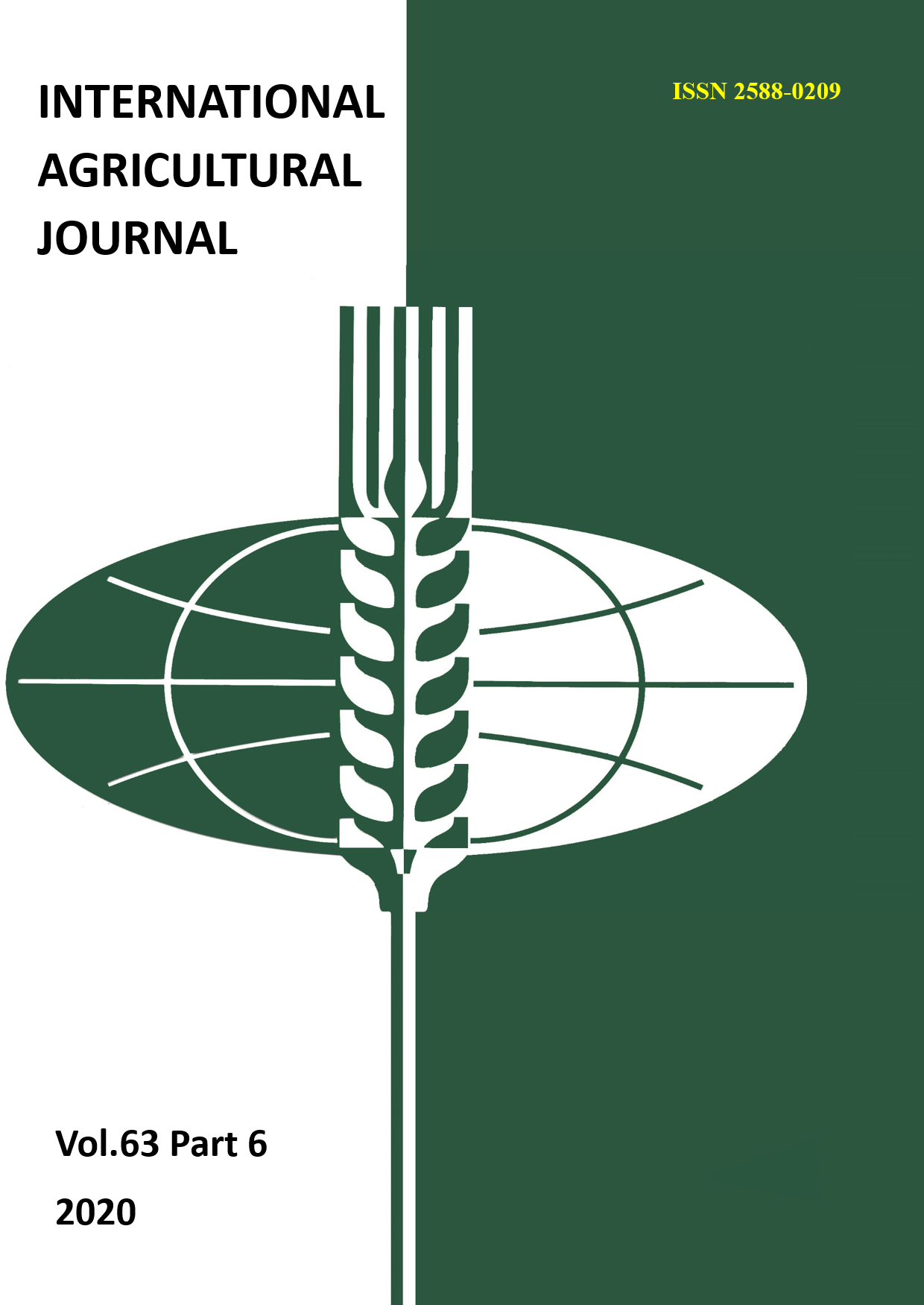THE ROLE OF THE INTEGRATION ELEMENTS OF THE SECTORAL SYSTEM OF PROFESSIONAL QUALIFICATIONS ARPK TO ADDRESS THE GOALS AND OBJECTIVES OF THE STRATEGY OF DEVELOPMENT OF AGRARIAN EDUCATION
Main Article Content
Abstract
The article discusses the goals and objectives presented In the strategy for the development of agricultural education in terms of the role and importance of integrating elements of the industry system of professional qualifications of the agro-industrial complex for their solution. The Foundation strategic goals and objectives of agricultural education is primarily to train highly qualified personnel for scientific and technological development of those sectors of agriculture that provide an accelerated import substitution of the main types of agricultural products, raw materials and food. The variety of natural and climatic conditions of our country requires specialists in the field of agriculture to have competencies that correspond to the specifics of the region. An important task of agricultural education is to provide the agro-industrial complex with educational programs aimed at rapid adaptation to the requirements of scientific and technological progress. Education and science must be even more responsive to the real needs of agriculture. Continuous modernization of the agro-industrial complex sets educational organizations the task of training specialists in new technologies of the agro-industrial complex, on a modern material and technical basis. The implementation of these tasks is possible only if the elements of the industry system of professional qualifications are integrated into a set of mechanisms for legal and institutional regulation of the demand for employee qualifications from the labor market and the supply of qualifications from the education and training system.
Article Details
References
2. Frolova, O. Y., Fomina, L. V., & Shmeleva, Z. N. (2020). The personnel competence qualification formation in the agro-industrial complex production systems: Managerial aspect. Paper presented at the IOP Conference Series: Earth and Environmental Science, 421(2) doi:10.1088/1755-1315/421/2/022029 Retrieved from www.scopus.com
3. Shirokorad, I. I., Fadeeva, O. M., Pafnutova, E. G. (2020). The green energy industry: current challenges and trends in the development of professional qualifications in agricultural specialists. Earth and Environmental Science 579 (2020) 012107. doi:10.1088/1755-1315/579/1/012107.
4. Zhabrovskii I.E., Dobysh G.F., Muchinskii A.V., Guleichik A.I. Sovershenstvovanie metodiki professional'nogo obucheniya pri povyshenii kvalifikatsii i perepodgotovke kadrov spetsialistov APK. Osnovnye napravleniya kardinal'nogo rosta ehffektivnosti APK v usloviyakh tsifrovizatsii. Sbornik materialov Mezhdunarodnoi nauchno-prakticheskoi konferentsii . 2019. S. 20-25.
5. Kazimirchenko O.V. O rabote ehkzamenatsionnogo tsentra FGBOU VO «KGTU». Perekhod na federal'nye gosudarstvennye obrazovatel'nye standarty vysshego obrazovaniya. Luchshie praktiki rybokhozyaistvennogo obrazovaniya. Materialy VIII natsional'noi nauchno-metodicheskoi konferentsii. Sostaviteli: A.A. Nedostup, YU.K. Aldushina. 2020. S. 14-22.
6. Komov N.V., Sharipov S.A., Nosov S.I., Tsypkin YU.A., Alakoz V.V., Ananicheva E.P., Bareshenkova K.A., Bliznyukova T.V., Bondarev B.E., Bugaevskaya V.V., Bugaevskii YU.L., Buyanov A.YU., Vladimirova I.L., Gubarev E.V., Dmitriev A.N., Emel'yanova T.A., Ivashchenko N.V., Il'ichev K.S., Kallaur G.YU., Kamaev R.A. i dr. Ustoichivoe prostranstvennoe razvitie. Monografiya. Proektirovanie i upravlenie / Moskva, 2021. – 752 s.
7. Natsional'nyi sovet pri Prezidente Rossiiskoi Federatsii po professional'nym kvalifikatsiyam. http://nspkrf.ru/ (data obrashcheniya: 17.11.2020)
8. Ofitsial'nyi sait Ministerstva sel'skogo khozyaistva Rossiiskoi Federatsii. https://mcx.gov.ru/ (data obrashcheniya: 17.11.2020)
9. Rizenko G.V., Kozina A.M. Innovatsionnoe obuchenie v sisteme dopolnitel'nogo professional'nogo obrazovaniya (na materiale novgorodskogo instituta perepodgotovki i povysheniya kvalifikatsii rukovodyashchikh kadrov i spetsialistov APK). Problemy sovremennogo agrarnogo obrazovaniya: soderzhanie, tekhnologii, kachestvo. Materialy Mezhdunarodnoi nauchnometodicheskoi konferentsii. 2018. S. 90-94.
10. Ryzhkova E.V., Fadeeva O.M., Shirokorad I.I. Stanovlenie i razvitie vysshego agrarnogo obrazovaniya v Rossii (XIX - nachalo XX vv.) Mezhdunarodnyi sel'skokhozyaistvennyi zhurnal. 2020. № 5 (377). S. 66-68. doi: 10.24411/2587-6740-2020-15096
11. Sovet po professional'nym kvalifikatsiyam agropromyshlennogo kompleksa. https://www.rapo-apk.ru/ (data obrashcheniya: 17.11.2020)
12. Strategiya razvitiya agrarnogo obrazovaniya [Ehlektronnyi dokument] http://old.mcx.ru/documents/document/v7_show/7051.191.htm (data obrashcheniya: 17.11.2020)
13. Strategiya razvitiya natsional'noi sistemy kvalifikatsii na period do 2030 goda [Ehlektronnyi dokument] https://docviewer.yandex.ru/view/1130000046434309/ (data obrashcheniya: 17.11.2020)
14. Tsypkin YU.A., Bliznyukova T.V., Cherkashina E.V., Lipski S.A., Shapovalov D.A., Fadeeva O.M. Razrabotka mekhanizmov polucheniya gosudarstvennoi podderzhki gosudarstvennymi byudzhetnymi obrazovatel'nymi i nauchnymi uchrezhdeniyami v ramkakh gosudarstvennoi programmy razvitiya sel'skogo khozyaistva i regulirovaniya rynkov sel'skokhozyaistvennoi produktsii, syr'ya i prodovol'stviya na 2013-2020 gody. Otchet o NIR ot 28.11.2018 (Minsel'khoz Rossii). – 98 s.
15. Cherepnina V. O formirovanii mekhanizmov gosregulirovaniya vzaimodeistviya rynka truda v APK RF. Normirovanie i oplata truda v sel'skom khozyaistve. 2020. № 1. S. 18-20.

